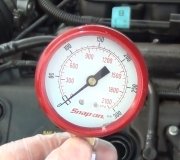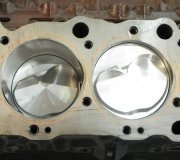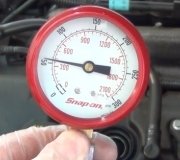It has 350,000 miles. It doesn't owe you anything.
You haven't described any problem or symptom so it's impossible to know what the best remedy is. You also have to look at how the compression test was done and if correct procedure was followed. The same conditions must be present for each cylinder's test. Looking at the numbers you listed, with each one getting lower in order, you'd have to suspect the procedure might be at fault. First of all, a battery charger should be attached to the battery and set to a slow charge rate. The compression test requires cranking the engine at least five revolutions and doing so runs the battery down. By the time you get to the last cylinder, it's going to be cranking slower which will make the readings lower.
During cranking, oil gets scraped off the cylinder walls. That oil helps the piston rings seal and do their job. It gets sprayed onto the cylinder walls when the engine is running at normal speed. When cranking the engine, it's running too slowly to spray oil so by the time you get to the last cylinder, it's going to read lower than normal. Experienced mechanics will check for that by repeating the test on the first cylinder after all four have been done. If it reads a lot lower than the first time it was tested, the procedure is more to blame than the engine wear.
The engine must also be warmed up before starting the compression test. If the mechanic gets interrupted in the middle of the test and the engine has time to cool down, parts contract and don't fit properly. The piston rings won't seal as well as normal.
Monday, January 11th, 2021 AT 6:21 PM
(Merged)





